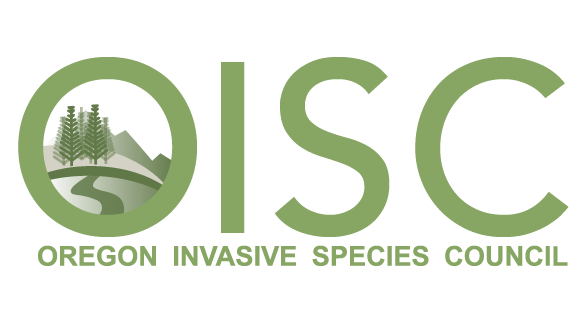2024 OISC Education & Outreach Grant Pre-Annoucement
New Grant for Invasive Species Education & Outreach Coming Soon
Invasive species pose serious threats to Oregon’s economy, ecosystems, working landscapes, infrastructure, and natural heritage. Unchecked, invasive species can imperil public health, fish and game populations, and outdoor recreation and transform ecosystems, resulting in widespread and long-lasting economic and environmental damage. Meaningful outreach and education are crucial to engaging and activating a wide network of people to protect Oregon from invasive species.
We are happy to announce that $160,000 in 2024-2025 biennium funds will be available to the Oregon Invasive Species Council (OISC) to fund education outreach projects. The Oregon Invasive Species Council will determine priorities and awards, while the Oregon Department of Agriculture (ODA) oversees the fiscal administration of the OISC Education Outreach Grant Program. The goal of the OISC is to fund as many high-priority projects as possible with the available funding and to make the process of developing a successful grant application as straightforward as possible.
● Project budgets must range from $5,000 to $50,000. Projects over $25,000 must show a collaborative, larger-scale watershed, community, or statewide education or outreach impact. Funding requests must align with the scale and reach of the project.
● Grants will be awarded based on the availability of funds.
The OISC encourages a broad array of applications that serve to inform and engage the public and/or specific audiences on invasive species, their impacts, pathways of introduction, prevention, and management relevant to protecting our clean water, working landscapes, food, wildlife, and the unique beauty of our state for future generations.
Project goals should be connected to understanding the impacts, spread, prevention, detection, or management of invasive species issues in Oregon, and be relevant to protecting our clean water, working landscapes, wildlife, and the unique beauty of our state for future generations.
Tentative Dates
Full grant announcement: Summer 2024
Application window: August 1, 2024 - October 15, 2024
Grant Awards announced: January 2025
Tentative Grant Cycle Dates: January 2025 - June 30, 2026
Sign up for grant notifications and other invasive species alerts:
Oregon Invasive Species Network: Sign up here (google group)
Oregon Noxious Weed list serve: Oregon noxious weed updates, meetings, and grant information
ODA Gov Delivery https://public.govdelivery.com/accounts/ORODA/subscriber/new
Or email Tristen Berg at Tristen.BERG@oda.oregon.gov request to be added to the Oregon Noxious Weed list serve.
Education & Outreach Projects
Projects can be implemented in a variety of ways. Successful applicants will have goals tied to:
The Education & Outreach Strategies outlined in Oregon’s Statewide Strategic Plan for Invasive Species
Expand awareness of invasive species through improved communication tools that effectively reach the Oregon public and messaging that resonates with Oregonians.
Collaboratively develop educational materials with network partners to pool expertise and resources.
Promote focused, inclusive outreach and engagement to build public support and involvement among historically under-represented audiences.
Understanding the prevention, detection, spread, impacts, or management of invasive species in Oregon, and
Protecting our aquatic resources, working landscapes, wildlife, and the unique beauty of our state for future generations.
Example projects may include, but will not be limited to:
Early Detection
Conduct workshops or trainings for natural resource or industry professionals on detecting priority species
Install signage about early detection and reporting of priority species
Best Practices
Conduct workshops or trainings for land managers on prevention, rapid response, and/or control practices
Sponsor and host public invasive species outreach that includes invasive species control, detection, and restoration activities
K-12 Education, Colleges, Youth Programs, Job Training, Alternative Education Programs, etc.
Develop and implement curriculum
Develop and implement outdoor education, restoration, or field trip opportunities
Sponsor a student art, written word, or spoken word contest/showcase in your district, school or other type of education or outreach center
Prevention
Develop and launch an education and outreach campaign
Distribute new communications materials or those already available through a variety of media to reach audiences who are at the highest risk of moving invasive species (see examples in the reference section)
Install boot brushes or wash stations and signage in high-traffic recreation areas to prevent and reduce the spread of invasive weeds
Spread information through travel and tourism offices about the impacts of invasive species and responsibilities of travelers
Building Awareness & Coordination
Coordinate a field day event with local elected officials and decision-makers showcasing priority issues such as invasive species issues of concern, successes, and challenges
Deliver a presentation(s) about invasive species issues to new audience groups (such as agriculture, irrigation, forestry, outdoor recreation hobbyists, real estate brokers, moving companies, human resources and recruitment firms, etc)
Collaborate with partners to develop interactive outreach kits
Grant Timeline: TBA
Tentative Grant Cycle Dates: January 2025 - June 30, 2026
Application Details: TBA
Application window: August 1, 2024 - October 15, 2024
Applications will be submitted electronically through the Oregon Department of Agriculture’s FTP Server
Reference Links:
Invasive Species Education & Outreach Grant Contacts: TBD
About the Oregon Invasive Species Council
The Oregon Invasive Species Council's mission is to protect Oregon's natural resources and economy by planning and leading a coordinated and comprehensive effort among state and public agencies, tribes, scientists, land managers, industry leaders, educators, and members of the public. The Oregon’s Statewide Strategic Plan for Invasive Species was adopted in 2017 and outlines strategies to achieve the following objectives: 1) Prevention; 2) Early Detection & Rapid Response; 3) Control & Management; 4) Education & Outreach; and 5) Coordination & Leadership.
